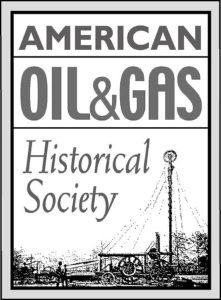Resources for educators, students and researchers.
National energy education contacts include federal programs and links to professional societies and trade organizations with information for teachers, students, and industry researchers. Also see State Energy Education Contacts.
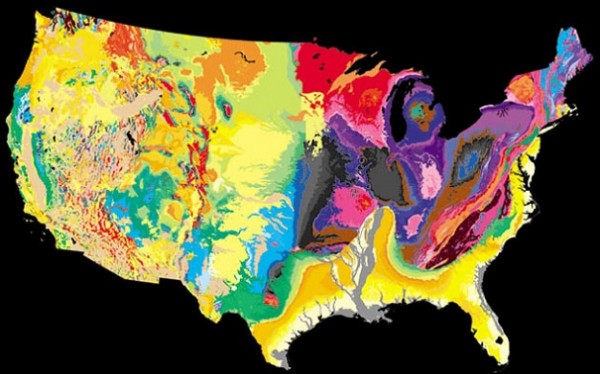
The art of geology is revealed in Philip Burke King and Helen Beikman’s 1974 Geologic Map of the United States. “King’s interests and methods of scientific inquiry were those of a field geologist who obtains his data from the rocks exposed at the earth’s surface,” notes the U.S. Geological Survey.
Many of the following resources are documented from updated information of the U.S. Department of Energy Energy Education Resources: Kindergarten through 12th Grade – edited to narrow its scope to petroleum. For a wider array of education topics for young people, visit Kids.gov.
————————————————————–
Department of Energy–Energy Information Administration
Established in 1978, the Energy Information Administration (EIA) is responsible for developing energy data, analyses, and forecasts that help enhance public understanding of energy issues. It was created, “in response to the need for additional Federal initiatives to collect and disseminate energy-related information, and to evaluate and analyze this information. These needs were revealed as the United States sought to respond to the energy crises of the 1970s.”
Among the many helpful EIA links is Petroleum & Other Liquids, which includes historical oil prices as early as 1860. Detailed statistics also can be found about Natural Gas. and a natural gas price timeline beginning in 1922.
EIA offers free fact sheets about annual domestic and international energy data. EIA links include energy summaries, a calendar listing schedules for future EIA publications, and other EIA databases covering energy sources.
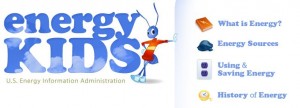 Plenty of good links here, especially for teachers looking for lesson plans, games and activities, field trip ideas and science links
Plenty of good links here, especially for teachers looking for lesson plans, games and activities, field trip ideas and science links
Department of Energy–Office of Fossil Energy
The Fossil Energy organization is made up of about 1,000 scientists, engineers, technicians and administrative staff. Its headquarters offices are in downtown Washington, DC, and in Germantown, Maryland. It includes the National Energy Technology Laboratory with offices in Morgantown, WV, Pittsburgh, PA, Tulsa, OK, Albany, OR, and Fairbanks, AK; the Strategic Petroleum Reserve based in New Orleans, LA; and the Rocky Mountain Oilfield Testing Center in Casper, WY.
The Office of Oil and Natural Gas, in the DOE’s Office of Fossil Energy, supports research and policy options to ensure clean, reliable, and affordable supplies for American consumers.
Department of Energy– Office of Scientific and Technical Information
A component of the DOE Office of Science, this organization has been sharing science information since 1947. OSTI’s mission is to advance science and technological creativity by making R&D findings available to DOE researchers. OSTI provides access to energy, science, and technology information through publicly available web-based systems.
R&D project summaries contain information on active DOE-sponsored research projects. Energy Files, the Energy Science and Technology Virtual Library, provides single-query access to databases and website resources pertaining to science.
Department of Energy–Pacific Northwest National Laboratory
A DOE-funded, multi-program national laboratory, Pacific Northwest National Laboratory puts science and technology to work to solve energy and environmental problems. PNNL focuses on research and development related to waste management, environmental restoration, global environmental change, energy, and national security. Programs provide opportunities for students and faculty to participate in hands-on science and technology research as it is conducted in a research laboratory and work with scientists using state-of-the-art equipment not commonly found in most schools.
U.S. Department of the Interior
The Department of the Interior is a cabinet-level agency that manages America’s natural and cultural resources. Its thousands of employees include scientists and resource-management professionals in nine technical bureaus: Bureau of Indian Affairs; Bureau of Land Management; Bureau of Ocean Energy Management; Bureau of Reclamation; Bureau of Safety and Environmental Enforcement; National Park Service; Office of Surface Mining Reclamation and Enforcement; U.S. Fish and Wildlife Service; and the U.S. Geological Survey.
U.S. Department of the Interior – Bureau of Ocean Energy Management
 The Bureau of Ocean Energy Management (BOEM), an agency within the Department of the Interior, was established in 2010 to exercise the oil, natural gas, and renewable energy-related management functions of the Minerals Management Service.
The Bureau of Ocean Energy Management (BOEM), an agency within the Department of the Interior, was established in 2010 to exercise the oil, natural gas, and renewable energy-related management functions of the Minerals Management Service.
“The Bureau of Ocean Energy Management (BOEM) sees public input as a critical component of the safe and responsible exploration and development of offshore resources. Public engagement and comment is solicited in our environmental review and regulatory programs for both oil and gas, and renewable energy proposals.”
From 2001 to 2008, BOEM (then MMS) funded a Gulf Coast oral history project about development of the offshore oil and natural gas industry. The effort, helping to preserve U.S. petroleum history, was done in partnership with the Louisiana State University Center For Energy Studies. The “History Of Offshore Oil Development In The Gulf Of Mexico” website includes links to reports, tapes and discs of interviews, transcripts, digital photos, and databases preserved at LSU, the University of Houston, and other universities.
Department of the Interior–Bureau of Land Management
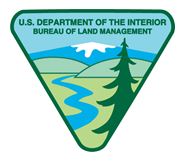 An agency responsible for managing over 261 million surface acres, and 700 million acres of sub-surface mineral estate. BLM’s multiple-use mission is to sustain the health, diversity, and productivity of the public lands.
An agency responsible for managing over 261 million surface acres, and 700 million acres of sub-surface mineral estate. BLM’s multiple-use mission is to sustain the health, diversity, and productivity of the public lands.
The agency manages recreation, wildlife habitat, cultural and historic sites, scenic and wilderness areas, wild horse and burros, livestock grazing, timber harvesting, and energy and mineral development. Offers a variety of educational energy-related programs and materials. Visit the website for programs available in your area, as well as educational products and presentations.
Environmental Protection Agency
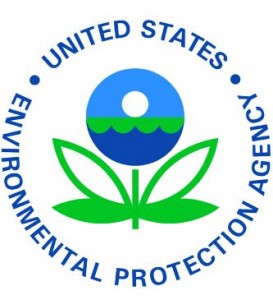 The Headquarters Library provides research assistance to EPA staff. The website contain many links to EPA science and technology offices, laws and regulations, and program topics. Reference assistance is provided to the public about environmental issues and EPA programs — and there is a section for young people, the Environmental Kids Club.
The Headquarters Library provides research assistance to EPA staff. The website contain many links to EPA science and technology offices, laws and regulations, and program topics. Reference assistance is provided to the public about environmental issues and EPA programs — and there is a section for young people, the Environmental Kids Club.
Federal Energy Regulatory Commission — Students’ Corner
The Federal Energy Regulatory Commission’s operates the Students’ Corner to explain to students of all ages how the commission regulates energy in the United States. FERC helps make it possible for you to flip a switch and have energy to run TVs, computers, video games, and everything else that needs power.
FERC also makes sure that natural gas is transported to where it is needed in the United States. Take a look at how FERC plays an important role in your life while enjoying the activities and games offered here.
Kid’s Page — Bureau of Ocean Energy Management, Regulation and Enforcement (formerly the Minerals Management Service)
Part of the U.S. Department of the Interior, this agency oversees 1.76 billion acres of the Outer Continental Shelf, managing offshore energy and minerals while protecting the human, marine, and coastal environments through advanced science and technology research. The program provides K-12 educational materials related to energy, minerals, and the environment on America’s offshore public lands. Materials based on MMS science and research in geosciences; physical oceanography; engineering; marine biology; deep sea ecosystems; marine archeology; and social sciences.
National Archives’ Digital Classroom
The National Archives’ Digital Classroom offers a large collection of teacher resources for the use of primary sources in the classroom. With access to copies of primary documents from the holdings of the U.S. National Archives, teachers can develop their own activities and lesson plans that make historical periods come alive for their students or choose from dozens of resources that have already been developed and are featured.
Programs include regional sessions for K-16 educators, librarians, media specialists, and museum educators. This website offers many useful related links for teacher training, lesson plans, publications, social media and more.
National Oceanic and Atmospheric Administration
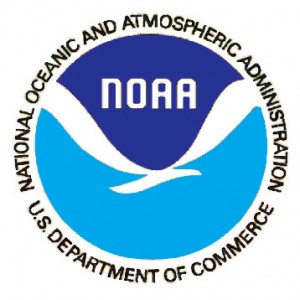 A part of the U.S. Department of Commerce, the history of the National Oceanic and Atmospheric Administration dates back to 1807 — when the nation’s first scientific agency, the Survey of the Coast, was established.
A part of the U.S. Department of Commerce, the history of the National Oceanic and Atmospheric Administration dates back to 1807 — when the nation’s first scientific agency, the Survey of the Coast, was established.
NOAA has evolved and now maintains facilities in every state. Its major offices include the National Environmental Satellite, Data, and Information Service; National Marine Fisheries Service; National Ocean Service; National Weather Service; Office of Oceanic and Atmospheric Research; and an Office of Program Planning and Integration. The National Ocean Service offers a variety of K-12 resources and links.
Petroleum Technology Transfer Council
The Petroleum Technology Transfer Council (PTTC) is a national nonprofit organization established in 1994 by petroleum producers, state organizations and the U.S. Department of Energy.
Led by an independent board of directors, “PTTC is a partnership to connect independents with the technology and knowledge to safely and responsibly develop the nation’s oil and gas resources. As such, it is an important part of America’s energy solution.”
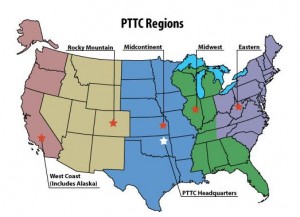 Established to provide a forum for the transfer of technology and best-practices within the producer community, local “producer advisory groups” ensure that PTTC activities in four U.S. regions address the pressing technology needs of oil and natural gas producers.
Established to provide a forum for the transfer of technology and best-practices within the producer community, local “producer advisory groups” ensure that PTTC activities in four U.S. regions address the pressing technology needs of oil and natural gas producers.
PTTC is a partnership “to connect independents with the technology and knowledge to safely and responsibly develop the nation’s resources.” It shares applied technology information via newsletters, websites, exhibitions and by participating in workshop and industry events.
United States Geological Survey
The United States Geological Survey was established on March 3, 1879, just a few hours before the mandatory close of the final session of the 45th Congress, when President Rutherford B. Hayes signed the bill appropriating money for sundry civil expenses of the Federal Government for the fiscal year beginning July 1, 1879.
USGS is a science organization that provides impartial information on the health of our ecosystems and environment, the natural hazards that threaten us, the natural resources we rely on, the impacts of climate and land-use change, and the core science systems that help us provide timely, relevant, and useable information.
“Every day the 10,000 scientists, technicians, and support staff of the USGS are working for you in more than 400 locations throughout the United States.”
The Survey provides scientific information intended to help educate the public about natural resources, natural hazards, geospatial data, and issues that affect our quality of life. Discover selected online resources, including lessons, data, maps, and more, to support teaching, learning, education (K-12), and university-level inquiry and research.
—————————————————————
More National Energy Education Resources
American Association of Professional Landmen
4100 Fossil Creek Blvd.
Fort Worth, TX 76137
(817) 847-7700
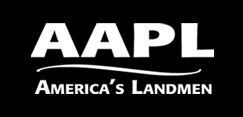 Landmen constitute the business side of the oil and gas and mineral exploration and production team. The American Association of Professional Landmen is a professional organization that unites landmen and land-related persons through professional development and service. Company landmen negotiate deals and trades with other companies and individuals, draft contracts (and administer their compliance), acquire leases and ensure compliance with governmental regulations.
Landmen constitute the business side of the oil and gas and mineral exploration and production team. The American Association of Professional Landmen is a professional organization that unites landmen and land-related persons through professional development and service. Company landmen negotiate deals and trades with other companies and individuals, draft contracts (and administer their compliance), acquire leases and ensure compliance with governmental regulations.
AAPL’s mission is to promote the highest standards of performance for all land professionals and to encourage sound stewardship of energy and mineral resources. Under the direction of its volunteer leadership and a professional staff, AAPL provides member development opportunities through seminars, workshops. home study programs, conferences, and other programs. The national energy education association publishes the bimonthly Landman magazine.
Association of Desk and Derrick Clubs
“Since the first meeting in 1949, the Association of Desk and Derrick Clubs (ADDC) has ebbed and flowed with the tides of the energy and allied industries,” explains the energy education organization’s website. “Currently about 2,500 women and men employed in or affiliated with the energy and allied industries comprise the 59 clubs located in the U.S. and Canada.”
The Desk and Derrick Journal (originally called the Oil and Gal Journal), which links club members and the association, is published three times a year – and is available online. ADDC also publishes “Bit of Fun” Energy Activity Book.
The Alliance to Save Energy
1850 M Street NW, Suite 600
Washington, DC 20036
202-857-0666
The Alliance to Save Energy is a coalition of prominent business, government, environmental, and consumer leaders who promote the efficient and clean use of energy worldwide to benefit consumers, the environment, economy, and national security.
The Alliance to Save Energy’s Energy Hog Campaign is a national public service advertising campaign created by the Ad Council in partnership with the U.S. Department of Energy, The Home Depot, North American Insulation Manufacturers Association, and 20 state energy offices. This energy education campaign targets children ages 8 to 13 and their parents and features a dastardly character, the Energy Hog, who bring to life the invisible concept of energy waste. Kids can become official Busters by winning five energy games on the campaign website. The teacher and student guides include a primer explaining where energy comes from and why energy is important.
National Energy Education Development––The NEED Project
8408 Kao Circle
Manassas, VA 20110
(703) 257-1117
A national network of students, educators, and business, government and community leaders dedicated to the design and delivery of comprehensive, non-biased kindergarten through 12th grade energy education curriculum. By meeting local, state, and national education standards, NEED programs provide students and teachers an opportunity to learn about energy through hands-on science, math, drama, social studies, art, and music.
Memberships are available to educators for little or no cost, based on availability of sponsorship, from NEED’s partners and sponsors. Participating educators receive the NEED Energy Kit with teacher guides to a variety of activities and a full portfolio of free items to complete their units based on their grade level. The materials include books on the nation’s leading energy sources; curriculum guides that help teachers plan comprehensive units to include the science of energy, energy sources, electricity, efficiency and conservation; and many evaluation/assessment and reinforcement options.
An extensive selection of hands-on science kits to teach energy transformations, solar energy, energy efficiency, electricity, magnets, and hydrogen are available and often sponsored. Workshops and conferences for teachers, students, and energy professionals are available throughout the year, and week-long summer training is offered annually.
3676 California Avenue, Suite A117
Salt Lake City, UT 84104
(801) 908-5800
A nonprofit educational organization providing educational resources and training services to educators. Initiatives include the Igniting Creative Energy Challenge, a national competition where K-12 students use their creativity to express their ideas related to being energy conscious. Entries include original art, music, literature, computer graphics, multimedia presentations, science projects, etc.
NEF produces energy-related instructional materials for K-12 teachers. Items include posters titled “Electrical Generation,” “Renewable Energy Sources,” “Exploring Natural Resources and Their Uses,” “Oil,” “High Performance Schools” and “Energy Management in and around Your School.” NEF provides a wide array of posters, learning activity guides, videos, and instructional music that focus on energy.
National Science Digital Library
P.O. Box 3000
Boulder, CO 80307
The National Science Foundation supports a large network of research and education resources through management and coordination of the National Science Digital Library, which includes a variety of educational resources to further STEM (science, technology, engineering and mathematics) education. Teachers can browse science literacy maps, short science refreshers, free multimedia downloads, or subject area collections.
The NSDL community is composed of many institutions — including universities, museums, libraries, research labs, federal agencies, professional societies, and commercial content providers. There are a variety of K-12 programs, notably a series of subject “pathways” for teachers. For example, SMILE: Science and Math Informal Learning Educators Pathway “offers collections of materials, activities, an services for museums and science centers, educators working in outdoor and field trip programs, other-than-school programs, educators and programs supporting underrepresented communities, and community-based youth development centers.”
Petroleum History Institute
P.O. Box 165
Oil City, PA 16301-0165
The mission of the Petroleum History Institute is to pursue the history, heritage and development of the modern oil industry from its 1859 inception in Oil Creek Valley, Pennsylvania, to its early roots in other regions in North America and the subsequent spread throughout the world to its current global status. The Institute is a nonprofit corporation.
To promote public awareness of the history and heritage of the international oil and gas industry through Oil-Industry History, the a peer-reviewed annual journal devoted to this history, symposia of professional presentations, guided field trips through regions rich in oil history, and through a re-print series of out-of-print books that have played an important role in the development of the industry.
Trade Associations & Societies
American Association of Petroleum Geologists
1444 S. Boulder Avenue
Tulsa, OK 74119
(918) 584 2555
With more than 31,000 members, the American Association of Petroleum Geologists (or AAPG) is dedicated to the advancement of the science of geology. AAPG was founded in 1917 to further exploration for and production of petroleum and is headquartered in Tulsa, Oklahoma.
The Student Chapter Program of AAPG is made up of collegiate groups of geoscience students and one of the world’s foremost co-educational programs within the geoscience sector with over 145 chapters. It provides students the opportunity to develop leadership skills and serves as a focal point for developing a feeling of professionalism through meeting industry representatives. For teachers, AAPG offers special K-12 links and resources.
The association also works with world’s largest oil companies. Every year these companies send teams to AAPG short courses, schools, and conferences — for continuing education necessary to train in the latest technologies for safe exploration and production. “Our professors and mentors all draw on actual industry experience to make their teaching more relevant. AAPG emphasizes hands-on experience in addition to formal presentations.”
AAPG has assumed a management role of the Petroleum Technology Transfer Council, which has been providing technology transfer workshops tailored especially to the independent oil and natural gas operator since 1994.
American Chemistry Council
1300 Wilson Boulevard
Arlington, VA 22209
(703) 741-5000
The American Chemistry Council represents companies engaged in the business of chemistry — members apply the science of chemistry to make products and services “that make people’s lives better, healthier and safer.” ACC is committed to national energy education and common sense advocacy to address public policy issues, and health and environmental research and product testing.
The American Energy Society
654 Gilman St.
Palo Alto, CA 94301
“We are the only professional organization that serves everyone in energy. We envision a world of abundant, affordable and safe energy. We are dedicated to serving the entire global energy community by: Providing verifiable, data-driven content. Promoting energy literacy. Encouraging civility across all energy sectors.”
American Geological Institute
4220 King Street
Alexandria, VA 22302-1502
(703) 379-2480
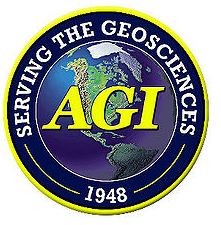 The American Geological Institute is a nonprofit federation of 42 geoscientific and professional associations that represents more than 100,000 geologists, geophysicists, and other earth scientists. Founded in 1948, AGI provides information services to geoscientists, serves as a voice of shared interests in our profession, plays a major role in strengthening geoscience education, and strives to increase public awareness of the vital role the geosciences play in society’s use of resources and interaction with the environment.
The American Geological Institute is a nonprofit federation of 42 geoscientific and professional associations that represents more than 100,000 geologists, geophysicists, and other earth scientists. Founded in 1948, AGI provides information services to geoscientists, serves as a voice of shared interests in our profession, plays a major role in strengthening geoscience education, and strives to increase public awareness of the vital role the geosciences play in society’s use of resources and interaction with the environment.
AGI disseminates information on earth science education through several publications, including high-school curricula (EarthComm) and middle-school curricula (Investigating Earth Systems); and workshops and presentations for teachers and educators. AGI publishes Geotimes, a monthly news magazine and provides geoscience career information.
Further, AGI sponsors the annual (and very popular) Earth Science Week to raise awareness about the earth sciences. Earth Science Week Kits and other AGI publications are available on the website. The institute’s Earth Science World ImageBank provides a library of geoscience images for free educational use.
American Gas Association
400 North Capitol Street, NW
Washington, DC 20001
(202) 824-7000
Natural gas supplies almost one-fourth of the United States’ energy needs. The American Gas Association, founded in 1918, represents about 200 local energy companies. There are more than 70 million residential, commercial and industrial natural gas customers in the nation and 91 percent — more than 64 million customers — receive natural gas from member companies. AGA “collects, analyzes and disseminates information on a timely basis to opinion leaders, policy makers and the public about the benefits provided by energy utilities and the natural gas industry.”
The American Gas Foundation is a 501(c)(3) organization focused on being an independent source of information research and programs on energy and environmental issues that affect public policy, with a particular emphasis on natural gas.
American Petroleum Institute
1220 L Street, N.W.
Washington, DC 20005
(202) 682-8081
API represents more than 450 oil and natural gas companies, leaders of a technology-driven industry that supplies most of America’s energy, supports more than 9.2 million U.S. jobs and 7.5 percent of the U.S. economy, and, since 2000, has invested nearly $2 trillion in U.S. capital projects to advance all forms of energy, including alternatives, while reducing the industry’s environmental footprint.
API is the primary trade association for the U.S. oil and natural gas industry. Representing companies engaged in the exploration, production, refining, transportation and marketing of petroleum, natural gas and related products. API supplies educational materials on the petroleum industry to teachers at no charge.
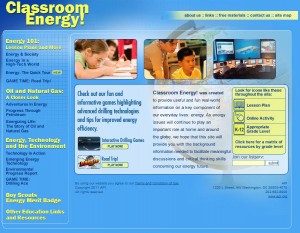 API has an outstanding online resource for educators and students — Classroom Energy— that includes classroom activities, interactive tours, and links to a variety of energy education resources. Program components, all correlated to national education standards, include a music CD and video, posters, study guide and website. See also API’s Adventures in Energy.
API has an outstanding online resource for educators and students — Classroom Energy— that includes classroom activities, interactive tours, and links to a variety of energy education resources. Program components, all correlated to national education standards, include a music CD and video, posters, study guide and website. See also API’s Adventures in Energy.
American Society Of Mechanical Engineers
The American Society of Mechanical Engineers, ASME, founded in 1880, today “enables collaboration, knowledge sharing and skill development across all engineering disciplines, while promoting the vital role of the engineer in society.”
ASME published codes and standards, hosts conferences, and provides continuing education and professional development programs to provide “a foundation for advancing technical knowledge and a safer world.”
American Plastics Council
1300 Wilson Boulevard
Arlington, VA 22209
(703) 741-5000
The American Plastics Council is a national trade association representing the largest resin producers, including monomer and polymer production and distribution. Founded in 1988, APC advocates unlimited opportunities for plastics and promotes their economic, environmental and societal benefits. Plastics: A World of Unlimited Opportunities. Plastics Make It Possible®.
APC has an interactive, online version of their Hands on Plastics: A Scientific Investigation Kit curriculum for grades 5-8, as well as the addition of a K-4 Curriculum. The curricula was developed in conjunction with the National Middle Level Science Teachers Association and features background information on plastics and polymers, multi-media examples of classroom activities, and ties to the National Science Education Standards. The information is also available on a CD-ROM. The free kit of supplemental materials for grades 5-8 curriculum can be ordered online, along with other APC publications.
Carriage Association of America
4075 Iron Works Parkway (Building D)
Lexington, KY 40511
(859) 231-0971
info@caaonline.com
Founded in 1960, the Carriage Association of America (CAA) is an international organization dedicated to preserving and restoring horse-drawn carriages and sleighs. It has introduced thousands of people “to the wonders of collecting these vehicles and the pleasures of driving them.”
The association’s official publication, The Carriage Journal, is published five times a year and features CAA members and their collections, and carriage exhibits at museums worldwide. “Our mission is to maintain a nonprofit association for the exchange of information regarding all aspects and use of animal-drawn vehicles and as an accurate source of technical information for the benefit of its members and the general public.”
Edison Electric Institute
701 Pennsylvania Avenue, N.W.
Washington, DC 20004-2696
(202) 508-5000
EEI is the association of shareholder-owned electric companies. EEI suggests that educators contact their local electric company. Many utilities have educational programs about energy and the environment for schools. EEI educational resources are located in the publications catalog online. Publications are available for a fee.
Association of Energy Service Companies — In February 2021, the Association of Energy Service Companies (AESC) and the Petroleum Equipment & Services Association (PESA) announced they would combine to create a new organization:
Energy Workforce & Technology Council
2500 Citywest Blvd., Suite 1110
Houston, TX 77042-3049
Phone: 713-932-0168
info@energyworkforce.org
Formerly the Petroleum Equipment Suppliers Association (PESA) and the Association of Energy Service Companies (AESC), the Energy Workforce & Technology Council was formed when the two associations combined in early 2021. The new group “is the unified voice for the energy industry’s service, supply and manufacturing organizations, advocating and supporting continued achievements in job creation, technological innovation and economic stability.”
Independent Petroleum Association of America
Information Services Department
1201 15th Street, N.W., Suite 300
Washington, DC 20005
(202) 857-4722
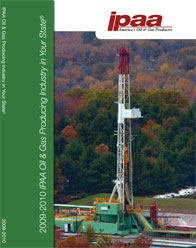 The national association represents independent crude oil and natural gas explorers/producers. Provides, for a fee, an annual yearbook of statistics on the crude oil- and natural gas-producing states. The Oil & Natural Gas Producing Industry In Your State compiles exploration and production statistics for each producing state.
The national association represents independent crude oil and natural gas explorers/producers. Provides, for a fee, an annual yearbook of statistics on the crude oil- and natural gas-producing states. The Oil & Natural Gas Producing Industry In Your State compiles exploration and production statistics for each producing state.
Useful for teachers and industry researchers, it also is suitable for junior and senior high school students. In addition to the annual editions of this publication, the association provides a statistical brochure entitled U.S. Petroleum Statistics that contains about 20 tables of statistical data for oil and natural gas.
The IPAA Education Foundation was formed in 1997. It supports programs that educate the public about the significant contributions that the oil and natural gas industry makes to the American economy and to society. The foundation provides grants to charitable and educational programs, particularly programs related to energy education and provides financial support for efforts that build tomorrow’s leaders.
A “Wildcatters’ Ball” is the primary industry fund raising event for the foundation. The proceeds from this annual event go toward funding education initiatives like the $100,000 Excellence in Education Award.
International Association of Drilling Contractors
10370 Richmond Ave, Suite 760
Houston, TX 77042
(713) 292-1945
Founded in 1940, the International Association of Drilling Contractors mission is to “improve industry health, safety and environmental practices; advance drilling and completion technology; and champion responsible standards, practices, legislation and regulations that provide for safe, efficient and environmentally sound drilling operations worldwide.”
IADC members include companies involved in drilling or production, well servicing, oilfield manufacturing or other rig-site services. IADC’s contract-drilling members own land and offshore drilling units that drill petroleum wells.
International Association of Geophysical Contractors
1225 North Loop West – Suite 220
Houston, TX 77008
(713) 957-8080 info@iagc.org
 “The International Association of Geophysical Contractors is the global trade association representing all segments of the geophysical industry, essential to discovering and delivering the world’s energy resources,” notes the IAGC website. “We are the global leader in geophysical technical and operational expertise for both land and marine operations. The IAGC works vigorously on behalf of the membership on issues of common interest and industry-wide topics and initiatives that support the continued vitality of the geophysical industry. Through advocacy, outreach and development of industry guidelines, the IAGC focuses on issues that affect the core businesses of the geophysical industry: data acquisition, data processing and data ownership.”
“The International Association of Geophysical Contractors is the global trade association representing all segments of the geophysical industry, essential to discovering and delivering the world’s energy resources,” notes the IAGC website. “We are the global leader in geophysical technical and operational expertise for both land and marine operations. The IAGC works vigorously on behalf of the membership on issues of common interest and industry-wide topics and initiatives that support the continued vitality of the geophysical industry. Through advocacy, outreach and development of industry guidelines, the IAGC focuses on issues that affect the core businesses of the geophysical industry: data acquisition, data processing and data ownership.”
National Oilheat Research Alliance
600 Cameron
Alexandria, VA 22314
(703) 340-1660
An independent, nonprofit organization dedicated to oil heating. NORA publishes national energy education books, reports, consumer guides, and fact sheets. Material covers energy use and efficiency, technical papers, and educational materials for technical training. Prepares video educational materials concerning the oilheating industry. There is a catalog of materials available at www.norastore.org. All materials are distributed at the cost of production.
The National Association of Division Order Analysts
P.O. Box 44009
Denver, Colorado 80201
administrator@nadoa.org
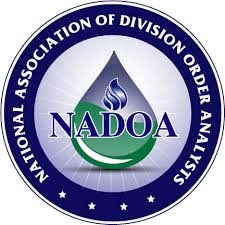 The National Association of Division Order Analysts (NADOA) was created in 1974 as a voluntary organization dedicated to promoting professionalism in the energy industry, where a division order analyst may be employed on a contract or permanent basis by a small independent exploration and production company, a major corporation, an oil or natural gas purchaser, a mineral owner, or trust department.
The National Association of Division Order Analysts (NADOA) was created in 1974 as a voluntary organization dedicated to promoting professionalism in the energy industry, where a division order analyst may be employed on a contract or permanent basis by a small independent exploration and production company, a major corporation, an oil or natural gas purchaser, a mineral owner, or trust department.
A typical NADO member “is responsible in some manner for the proper distribution of revenues obtained from oil and/or gas production or other mineral deposits, which includes the ongoing maintenance of the mineral ownership of those wells. We possess a wealth of knowledge in land and mineral title work.”
National Association of Lease and Title Analysts
4747 Research Forest Drive, Suite 180-221
The Woodlands, Texas 77381
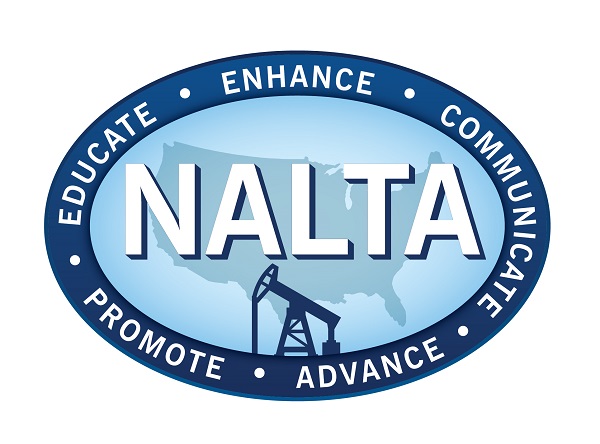 Founded in 1985, the National Association of Lease and Title Analysts (NALTA), promotes professionalism, knowledge, innovation, and networking for lease and title analysts of the energy industry.
Founded in 1985, the National Association of Lease and Title Analysts (NALTA), promotes professionalism, knowledge, innovation, and networking for lease and title analysts of the energy industry.
“Providing educational opportunities for the lease and title analyst profession is a hallmark of NALTA,” which hosts an annual conference and conducts or jointly sponsors regional seminars with its chapters or other organizations. NALTA implemented the Certified Professional Lease and Title Analyst (CPLTA) program in 1989, “to enhance the professional status and provide a reliable standard of excellence and achievement among qualified lease and title analysts.”
Paleontological Research Institution and Museum of the Earth
1259 Trumansburg Road
Ithaca, NY 14850
(607) 273-6623
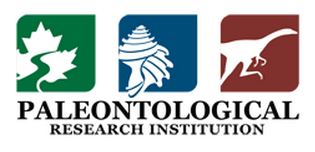 In addition to being a natural history museum based in Ithaca, New York, the Paleontological Research Institution (PRI), an American Geological Institute member society, offers education materials for science teachers and students at all grade levels.
In addition to being a natural history museum based in Ithaca, New York, the Paleontological Research Institution (PRI), an American Geological Institute member society, offers education materials for science teachers and students at all grade levels.
An online “Teacher Friendly Guide” gives brief geologic histories of the United States. Since 2003, PRI has offered the Museum of the Earth, which focuses on all of Earth’s history and its life forms, with particular focus on the Northeastern United States. PRI has programs in research, publications, collections, and public outreach. Its paleontological research journal, Bulletins of American Paleontology, first published in 1895, is the oldest in the Western Hemisphere. The museum’s website is a great place to learn about paleontology and geology.
Petroleum Equipment Institute members manufacture, distribute, and service petroleum marketing and liquid handling equipment. The trade association, founded in 1951, :represents more than 1,600 member companies in all 50 states and more than 80 countries. Members include manufacturers, sellers and installers of equipment used in service stations, terminals, bulk plants, fuel, oil and gasoline delivery, and similar petroleum marketing operations.”
Petroleum Equipment Suppliers Association
In February 2021, the Petroleum Equipment & Services Association (PESA) and the Association of Energy Service Companies (AESC) announced they would combine to create a new organization, the Energy Workforce & Technology Council.
Propane Education & Research Council
1140 Connecticut Ave., N.W., Suite 1075
Washington, DC 20036
(202) 452-8975
PERC promotes the safe, efficient use of propane as a preferred energy source. Fact sheets, consumer safety brochures with a scratch and sniff feature, coloring books, and industry safety videos are available online at www.propanecatalog.com. Additional information is available on both organizations’ websites.
Road Map Collectors Association
The Road Map Collectors Association (RMCA) educates the public about historic road maps from the automobile age. Founded in 1996, RMCA preserves the historical aspects of road maps, and facilitates the collection, preservation and dissemination of information regarding the history of road maps.
Member collections include road maps, road atlases and street guides, folding maps distributed by gas stations, state/provincial governments, automobile clubs and various commercial publishers, as well as of related cartographic documents. The association publishes a quarterly publication, The Legend, with an archive that can be downloaded by members.
As part of its annual fall meetings, RMCA hosts its MapCon, which in 2021 took place in Hershey, Pennsylvania, with events at the Antique Automobile Club of America Museum — where RMCA members maintain a revolving, curated exhibit on historic road maps.
Society of Exploration Geophysicists
8801 South Yale Suite 500
Tulsa, OK 74137-3575
(918) 497-5500
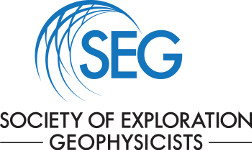 Founded in 1930, the Society of Exploration Geophysicists promotes the science of applied geophysics and the education of geophysicists. With more than 14,000 members in 114 countries in 2020, SEG fosters geophysics in the exploration and development of natural resources. An online searchable digital library provides access to the society’s journals, meeting abstracts, and e-books.
Founded in 1930, the Society of Exploration Geophysicists promotes the science of applied geophysics and the education of geophysicists. With more than 14,000 members in 114 countries in 2020, SEG fosters geophysics in the exploration and development of natural resources. An online searchable digital library provides access to the society’s journals, meeting abstracts, and e-books.
The SEG Digital Library research collection contains a complete archive of all technical articles expanded abstracts from SEG’s annual meeting technical program.
Society for Industrial Archeology
Department of Social Sciences, Michigan Technological University
1400 Townsend Drive, Houghton, MI 49931-1295
(906) 487-1889
Established in 1971 at Michigan Technological University, the Society for Industrial Archeology encourages the study, interpretation, and preservation of historically significant industrial sites, structures, artifacts, and technology. “By providing a forum for the discussion and exchange of information, the Society advances an awareness and appreciation of the value of preserving our industrial heritage,” notes the SIA website. Society members advocate the “preservation of the physical survivals of our industrial and technological past” and the “physical evidence of industry and technology-the study, interpretation, and preservation of historically significant sites, structures, buildings, artifacts, industrial processes, bridges, railroads, canals, landscapes, and communities.”
Society of Petroleum Engineers
222 Palisades Creek Dr.
Richardson TX 75080
(972) 952-1109
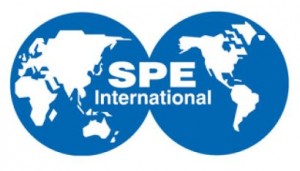 During the decade after the 1901 discovery of the Spindletop field, the American Institute of Mining Engineers saw a growing need for a forum in the booming new field of petroleum engineering. As a result, the group formed a committee on oil and natural gas in 1913.
During the decade after the 1901 discovery of the Spindletop field, the American Institute of Mining Engineers saw a growing need for a forum in the booming new field of petroleum engineering. As a result, the group formed a committee on oil and natural gas in 1913.
In 1957, the original but greatly expanded petroleum committee became a professional society — the Society of Petroleum Engineers. The first SPE board of directors meeting was held October 6, 1957, making 2007 the 50th anniversary for SPE as a professional society. Today, there are more than 92,000 SPE members worldwide.
The SPE Foundation was established in 1977.

A leading energy education program for young people, SPE’s Energy4me seeks to provide factual, non-biased resources for students, teachers and the public to become more educated energy consumers.
The Energy4me program offers a global energy perspective with website, speaker programs, and educational tools. Students of all grade levels can use the website as a single source for factual information on all types of energy. Comprehensive information about energy careers are available online.
Women’s Energy Network
201 E. Main Street, Suite 1405
Lexington, KY 40507
(855) 390-0650
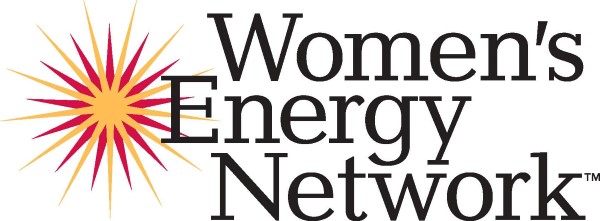 The Women’s Energy Network (WEN) is an international organization of professionals who work across the energy value chain. It was founded in 1994 by Karyl White to foster the development and advancement of women in energy by developing a strong network.
The Women’s Energy Network (WEN) is an international organization of professionals who work across the energy value chain. It was founded in 1994 by Karyl White to foster the development and advancement of women in energy by developing a strong network.
“Our mission is to provide networking opportunities and foster the career and leadership development of women who work in the energy industries. WEN’s vision is to be the premier global organization that educates, attracts, retains, and develops professionals working across the energy value chain. WEN offers educational, networking and leadership opportunities to more than 6,000 professionals nationwide through networking events, conferences, community initiatives, social outings, and mentoring programs.”
_________________
he American Oil & Gas Historical Society (AOGHS) preserves U.S. petroleum history. Please become an AOGHS annual supporter and help maintain this energy education website and expand historical research. For more information, contact bawells@aoghs.org. Copyright © 2025 Bruce A. Wells.


